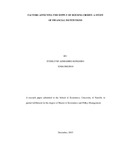| dc.description.abstract | The main objective of this study was to determine the factors that determine the supply of
housing credit in Kenya. It particularly focused on the effect of firm level and
macroeconomic factors on the supply of housing credit. The firm level factors included
profitability (ROA), liquidity (capital-asset-ratio), and deposit liability. The
macroeconomic factors/ variables included lending interest rate, GDP growth, and
inflation rate. Housing credit supply was proxied by mortgage provided by all the 43
commercial banks in Kenya for the period 2005 to 2014. The study used panel data,
which was analyzed using the Fixed Effects Model (FEM), Random Effects Model
(REM), and General Method of Moments (GMM).
In the fixed effects and random effects model, liquidity and deposits had a positive and
statistically significant relationship with housing credit supply. Inflation rate had a
negative and significant relationship with housing credit supply. However, GDP growth
and profitability had no statistically significant relationship with housing credit supply. In
the GMM, liquidity and deposit liabilities had a positive and statistically significant effect
on the supply of housing credit. Profitability (ROA), on the other hand, had a negative
and statistically significant relationship with housing credit supply. Interest rate had a
positive relationship with credit supply. However, inflation rate had no statistically
significant relationship with housing credit supply. This implies that firm level factors
had the greatest influence on the supply of housing credit.
Based on these findings the study recommends that the Central Bank should focus on
enforcing appropriate minimum capital requirement to ensure that banks are stable. The
resulting improvement in savers and investors’ confidence will increase deposits, which
will in turn increase housing credit supply. Banks should also incentivize the public to
save by reducing interest rates spread. The government should also improve regulation of
the banking industry to ensure that deposits are safe in financial institutions. This will
improve access to funds, thereby increasing housing credit supply. | en_US |



